History Highlights
2024
Presidency:Albania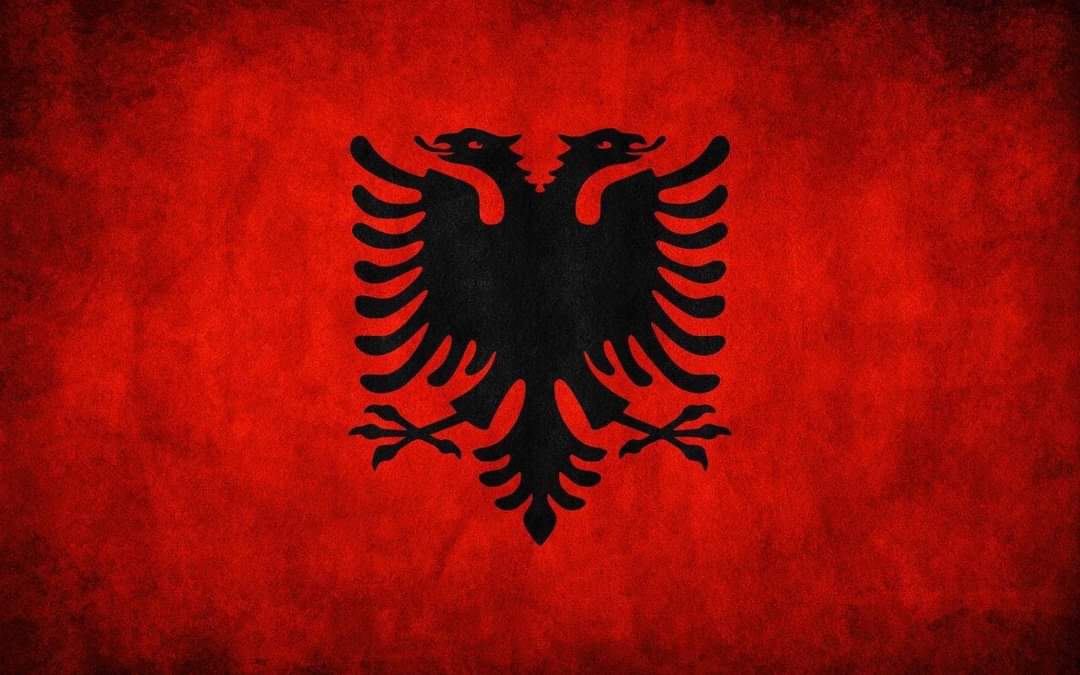
- New Plan of Action 2024 - 2026
- Institutional evolution through the CEI Strengthening Convention
- The Convention for the Strengthening of the CEI, launched in 2024, marked a significant step in shaping the Organisation’s future. Over three high-level meetings at CEI Headquarters, the Italian MFA, and the Italian Parliament the Convention served as an inclusive, multi-stakeholder forum culminating in endorsed recommendations aimed at modernising and reinforcing CEI’s institutional setup and regional role.
- Albanian Presidency advances integration and regional cooperation
- Under the Albanian CEI Presidency, the agenda emphasised European integration, tourism and culture, health systems, and political cooperation—strengthening CEI's alignment with EU values and connectivity priorities.
- Parliamentary Assembly reaffirms commitment to European integration
- The Final Declaration of the 2024 CEI Parliamentary Assembly, adopted in Tirana, reaffirmed strong political will for enhanced cooperation in support of European integration, including targeted references to youth, security, and institutional development.
- CEI gains Observer Status in Council of Europe Youth Committees
- CEI was granted Observer Status with the Council of Europe Youth Committees, reinforcing its role in youth-oriented multilateral platforms.
- UN General Assembly resolution enhances CEI’s global recognition
- The UN General Assembly adopted a resolution recognising CEI as a key partner in promoting peace, development, and integration in Central and Eastern Europe, confirming the CEI’s enhanced visibility and multilateral standing.
2023
Presidency:Moldova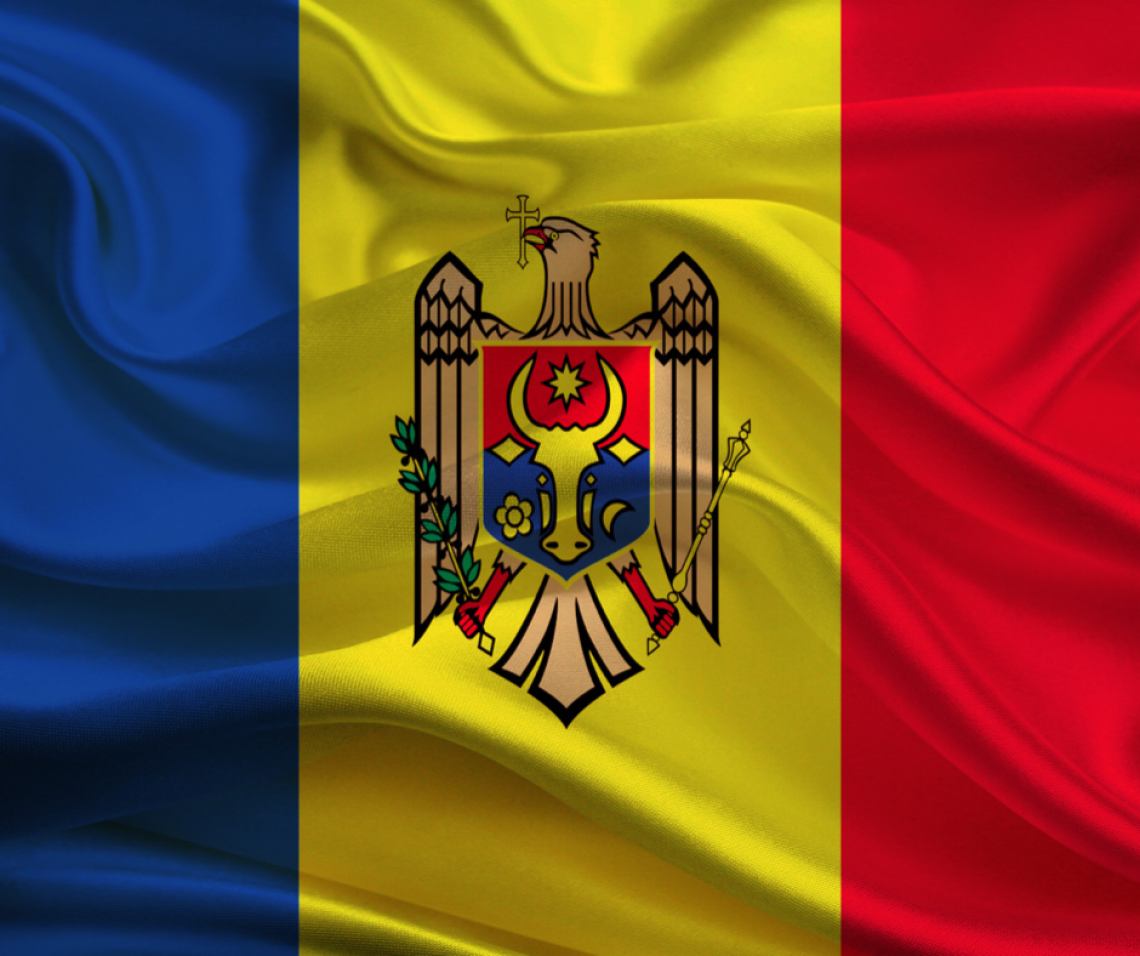
- During its presidency, Moldova led the CEI with a strong focus on support to Ukraine, EU enlargement, youth engagement, connectivity, and cultural cooperation, increasing CEI visibility in multilateral and European fora.
- Launch of CEI Flagship Events and Strategic Streams
- Under the 2023 Cooperation Fund Call, CEI introduced two new funding streams— “Flagship Events” and joint activities with international partners—aimed at boosting strategic impact and visibility, in alignment with the upcoming PoA 2024–2026.
2022
Presidency:Bulgaria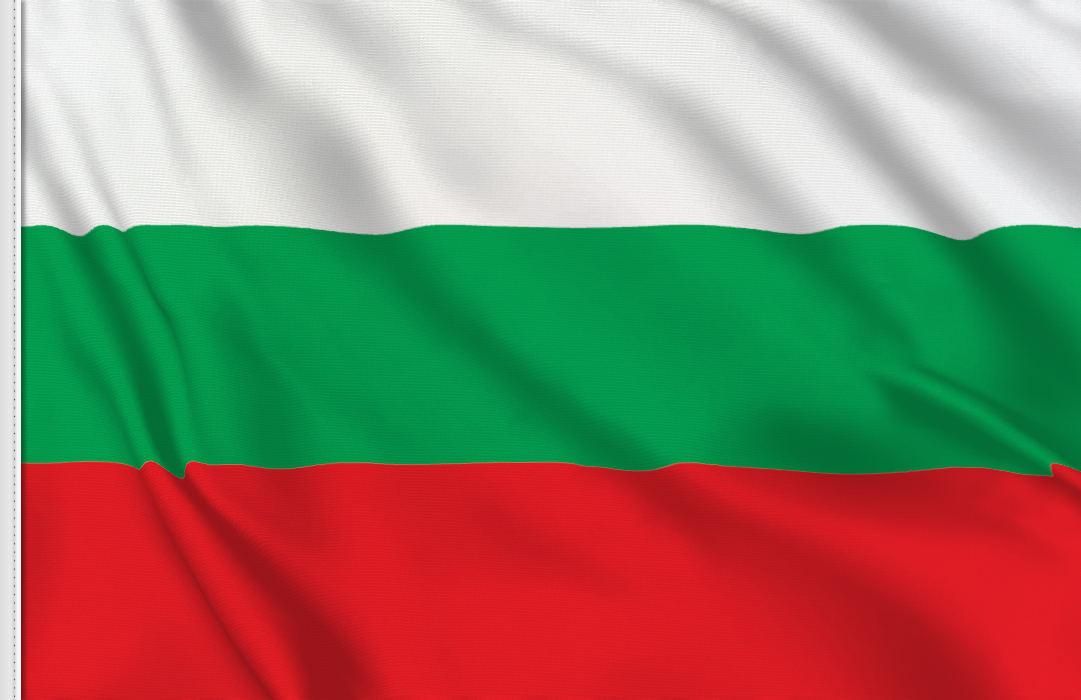
- During it's presidency, Bulgaria led the CEI through a turbulent year marked by the war in Ukraine, focusing on EU integration, regional solidarity, energy resilience, and sustainability.
- Joint Statement of the CEI Foreign Ministers (Sofia, 7 November)
- Ministers reaffirmed support for Ukraine and European integration. The statement condemns Russia’s aggression, backed EU enlargement, and highlighted CEI’s strategic positioning within the UN framework.
- Suspension of Belarus from CEI Representation Rights (25 March)
- Following Belarus’ support for Russia’s aggression against Ukraine, CEI suspended its representation rights—an unprecedented institutional measure in the organisation’s history.
- Humanitarian Assistance Mechanism for Ukraine
-
The CEI has set up a bespoke support programme for Ukraine and areas affected by the war, comprising educational hubs, emergency services and assistance with essential supplies. This programme is managed through CEI-administered and regional funds. One specific support action under the CEI Cooperation Fund helped Ukrainian refugee students continue their studies and access soft skills and IT training in Poland.
-
- MoU with Regional Anti-Corruption Initiative (RAI)
- Signed in December, this agreement expanded CEI’s institutional cooperation in the field of anti-corruption, transparency, and governance reforms.
2021
Presidency:Montenegro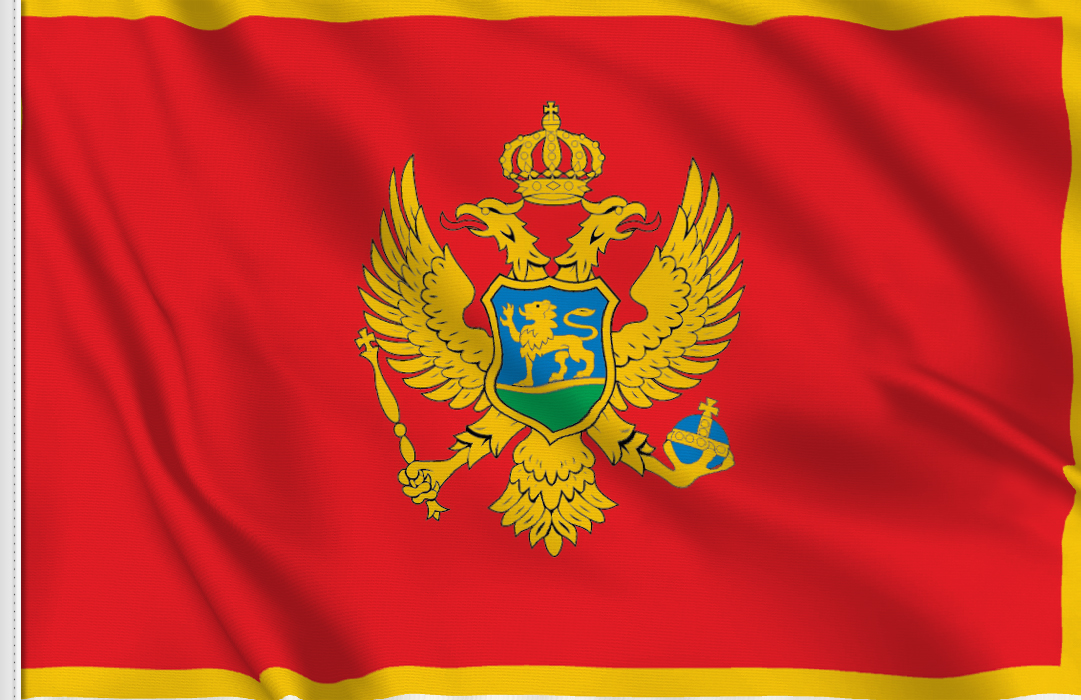
- Montenegro continued its mandate in 2021, with an emphasis on green transition, regional solidarity, and the active involvement of local stakeholders.
- Support to WHO Roadmap for Health and Well-being in the Western Balkans (2021–2025)
- CEI backed the WHO strategic framework for public health cooperation in the region, issuing a Joint Statement of Action in support of health equity and resilience.
- Operationalisation of the CEI Local Dimension
- Building on its 2019 launch, the Local Dimension became functionally integrated in 2021, enhancing the involvement of local and regional authorities in CEI cross-border activities.
2020
Presidency:Montenegro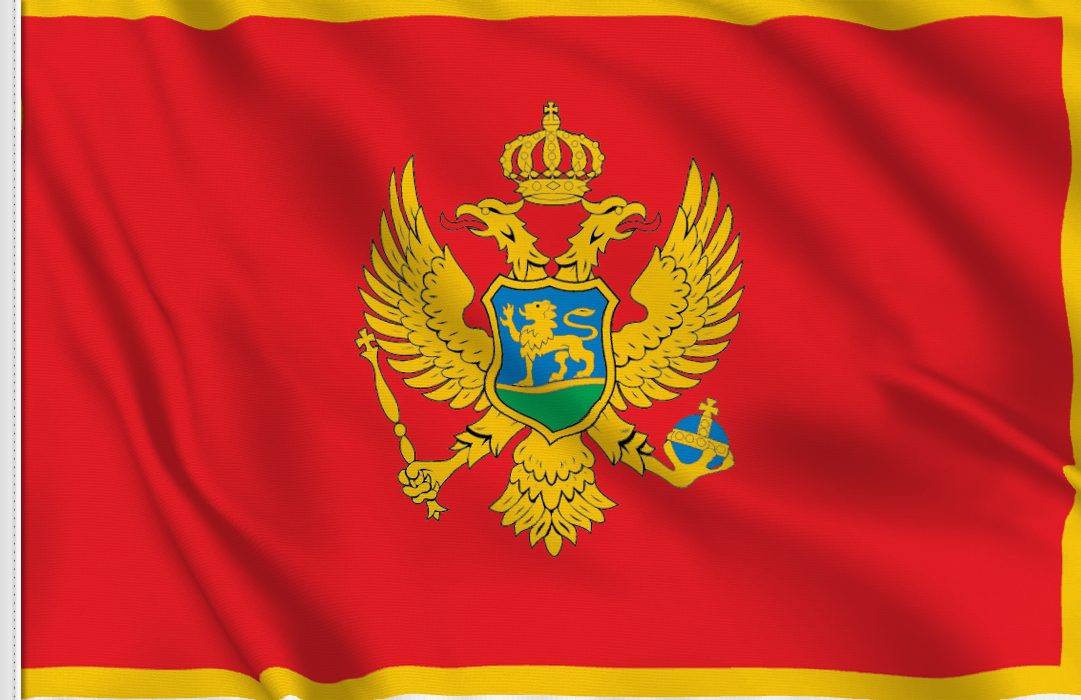
- During its presidency Montenegro led the Organisation through the pandemic with a focus on resilience, health coordination, and digital transformation.
- Joint Statement on COVID-19 Recovery
- Issued at the Extraordinary CEI Virtual Summit on 15 May 2020, the statement highlighted regional solidarity, cross-border health cooperation, digitalisation, and support for education and SMEs.
- UNGA Resolution on CEI–UN Cooperation
- Adopted on 23 November 2020, the resolution acknowledged CEI’s multilateral engagement during the COVID-19 crisis and its cooperation with WHO and other UN agencies on health and sustainable development.
- Strengthened Partnership with WHO/Europe
- The CEI enhanced cooperation with WHO/Europe to support regional coordination, public health strategies, and institutional resilience during the health crisis.
- Creation of CEI–WHO COVID-19 Task Force
- A joint coordination platform launched in 2020 to support national health authorities in pandemic response. It organised regular meetings and technical webinars to exchange practices and reinforce system preparedness.
- Extraordinary COVID-19 Call for Proposals
- In response to the emergency, CEI launched a dedicated call supporting 22 projects in healthcare, digital education, and SME recovery. With €600,000 allocated and over 7,000 applications received, it marked a major operational success in crisis response.
- CEI Plan of Action 2021–2023
- Adopted via written procedure on 31 December 2020, the Plan introduced the strategic pillars “Just Societies” and “Green Growth,” aligning CEI’s mission with post-pandemic recovery, EU integration, and the UN 2030 Agenda.
2019
Presidency:Italy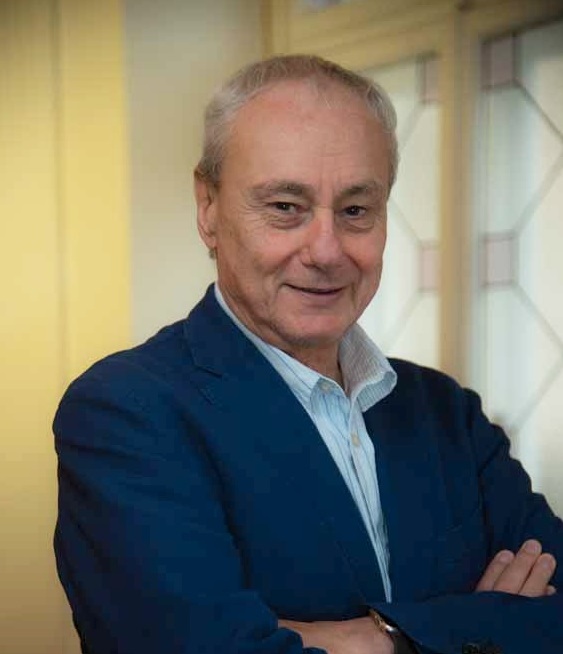
- 30th Anniversary of the CEI
- Mr. Roberto Antonione (Italy)
Secretary General - Adoption of the PoA 2021-2023
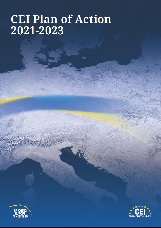
- Italy's mission during it's presidency placed strong emphasis on youth, connectivity, local governance, and strategic alignment with the EU and UN agendas.
- Launch of the CEI Local Dimension
- The CEI Local Dimension was formally established as a structural component of CEI cooperation, involving municipalities and regional authorities in advancing sustainable territorial development.
- In the context of the new CEI Local Dimension and Youth Agenda, the Organisation initiated partnerships with relevant stakeholders including local authorities and youth organisations, reinforcing its multilevel governance approach.
- Trieste Declaration of CEI Foreign Ministers
- Adopted on 12 June 2019, the declaration reaffirmed CEI’s strategic direction on regional cooperation, the rule of law, connectivity, and youth engagement. It also formalised the launch of the CEI Local Dimension and the Youth Agenda as institutional priorities.
- CEI Presentation at the UN High-Level Political Forum (HLPF)
- At the UN HLPF in July 2019, CEI presented its contribution to the 2030 Agenda, highlighting its role in promoting SDG implementation across Central, Eastern and South-Eastern Europe.
2018
Presidency:Croatia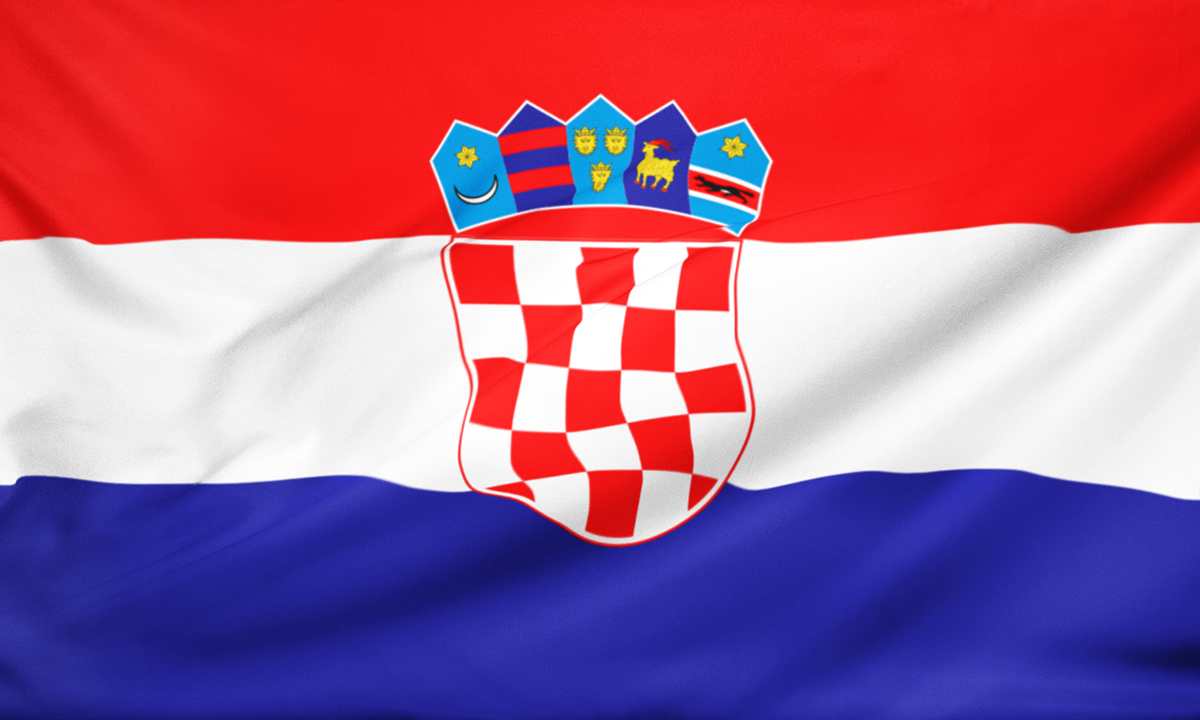
- Croatia's mission during it's presidency, aimed to support non-EU countries’ integration, regional dialogue, and multilateral cooperation. It strongly promoted alignment with EU standards and the UN agenda.
- Revised CEI Guidelines and Rules of Procedure
- At the CEI Summit in Zagreb, 3-4 December 2018, the adopted Guidelines aimed to streamline decision-making and strengthen institutional functioning.
- Strengthened Cooperation with UN, UNESCO, and Regional Stakeholders
- Throughout 2018, CEI expanded its cooperation with the UN and UNESCO and reinforced dialogue with regional organisations such as the Adriatic-Ionian Initiative and the RCC, enhancing CEI’s visibility and multilateral engagement.
- UNGA Resolution on CEI–UN Cooperation
- 26 November 2018, the UN General Assembly adopted the fourth consecutive resolution on CEI–UN cooperation, recognising CEI's contribution to multilateralism, integration, and sustainable development in partnerships with UNESCO, ECE and other UN specialised agencies. The resolution acknowledged CEI’s pragmatic, project-oriented role in advancing the UN 2030 Agenda.
2017
Presidency:Belarus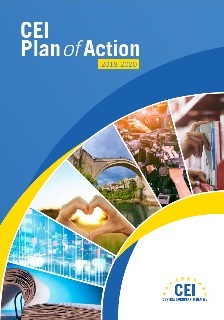 CEI Plan of Action 2018-2020
CEI Plan of Action 2018-2020- Adoption of the PoA 2018-2020
- MoUs with:
- the Secretariat of the Danube Commission - signed in Trieste on 28 March 2017
- IGINP - signed in Trieste on 16 May 2017
2016
Presidency:Bosnia and Herzegovina- MoUs with:
- International Centre for Migration Policy Development (ICMPD) - signed in Vienna on 30 May 2016 - SIGNED in Vienna on 30 May 2016
- International Organization for Migration (IOM) - signed in Sarajevo on 13 December 2016
- The recipients of the CEI Medal of Honour in the year 2016 were the following:
- Min. Plen. Andrea Orizio, former CEI National Coordinator (Italy)
- MoUs with:
2015
Presidency:Macedonia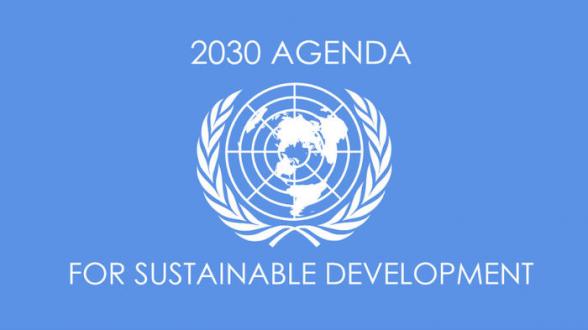 United Nations 2030 Agenda for Sustainable Development, September 27, 2015
United Nations 2030 Agenda for Sustainable Development, September 27, 2015- A CEI approach to migration management: Extraordinary Call Migration
- Joint Statement of the Member States of the Central European Initiative at the United Nations Sustainable Development Summit 2015 to adopt the “2030 Agenda for Sustainable Development”.
- MoUs with:
- International Institute for Applied Systems Analysis (IIASA) - signed in Vienna on 4 May 2015
- Migration, Asylum, Refugees Regional Initiative (MARRI) - Regional Centre - signed in Skopje on 16 December 2015
- The recipients of the CEI Medal of Honour in the year 2015 were the following:
- Amb. Heidemaria Guerer, former CEI National Coordinator (Austria)
2014
Presidency:Austria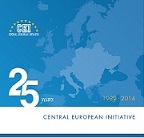 Publication on occasion of 25th Anniversary
Publication on occasion of 25th Anniversary- 2nd MoU with Regional Cooperation Council (RCC) - signed in Vienna on 3 June 2014
- UN General Assembly adopts Resolution on Cooperation between UN and CEI
- Publication on the occasion of 25th Anniversary
- The recipients of the CEI Medal of Honour in the year 2014 were the following:
- Sen. Roberto Antonione, Chairman of the Italian Parliamentary Delegation at the CEI Parliamentary Assembly and former Italian Deputy Minister for Foreign Affairs (Italy)
2013
Presidency:Hungary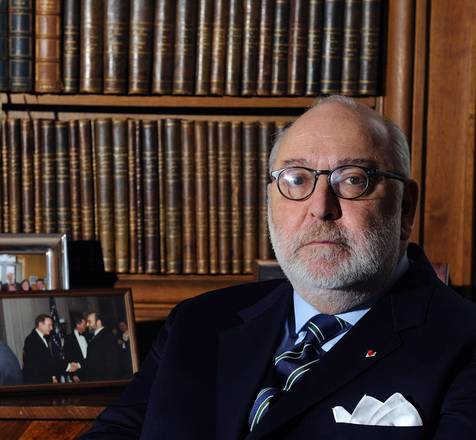 Amb. Giovanni Caracciolo di Vietri
Amb. Giovanni Caracciolo di Vietri- Amb. Giovanni Caracciolo di Vietri (Italy)
Secretary General - Revisited Business Dimension
- Croatia joins EU
- The recipients of the CEI Medal of Honour in the year 2013 were the following:
- Amb. Gerhard Pfanzelter, former CEI Secretary General (Austria)
- Sen. Oskar Peterlini, former Chairman of the General Committee on Cultural Affairs of the CEI Parliamentary Dimension (Italy)
- Amb. Giovanni Caracciolo di Vietri (Italy)
2012
Presidency:Ukraine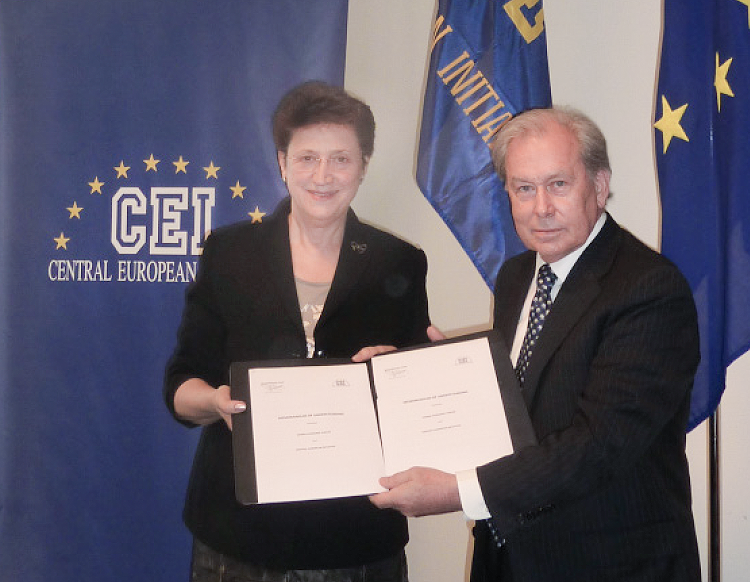 Amb. Gerhard Pfanzelter, CEI Secretary General, and Amb. Elena Kirtcheva, the Secretary General of the Vienna Economic Forum
Amb. Gerhard Pfanzelter, CEI Secretary General, and Amb. Elena Kirtcheva, the Secretary General of the Vienna Economic Forum- CEI participates in Sixty-Seventh Session of UN General Assembly where resolution 67/7 on Cooperation between United Nations and Central European Initiative was adopted
- MoU with Vienna Economic Forum - signed in Trieste on 4 June 2012
2011
Presidency:Serbia From left: BSEC SG, Amb. Chrysanthopoulos and CEI SG Amb. Pfanzelter
From left: BSEC SG, Amb. Chrysanthopoulos and CEI SG Amb. Pfanzelter- Obtains observer status in UN General Assembly unanimously granted by Resolution 66/111
- MoU with Black Sea Economic Cooperation (BSEC) - signed at BSEC HQ on 7 March 2011
- Implementation of Budva Recommendations which confirmed the CEI’s central mission: bringing non-EU countries closer to the EU.
2010
Presidency:Montenegro Amb. Gerhard Pfanzelter
Amb. Gerhard Pfanzelter- Amb. Gerhard Pfanzelter (Austria)
Secretary General - Participates in elaboration of Danube Strategy and enhanced partnership with EU
- Establishment of International Group of Experts (IGE) on Strengthening of the CEI resulting in Budva Recommendations adopted by the MFAs.The Group established excellent foundations for streamlining CEI’s activities and enhancing its role in the region, thus making the Organisation a more effective instrument in the process of EU rapprochement and further EU accession of its non-EU countries.
- The recipients of the CEI Medal of Honour in the year 2010 were the following:
- Min. Plen. Guglielmo Ardizzone, former National Coordinator (Italy)
- Amb. Gerhard Pfanzelter (Austria)
2009
Presidency:Romania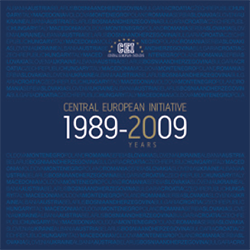 Publication on occasion of 20th Anniversary
Publication on occasion of 20th Anniversary- MoUs with:
- Regional Cooperation Council (RCC) - signed in Sarajevo on 12 May 2009
- UNESCO Office in Venice
- The recipients of the CEI Medal of Honour in the year 2009 were the following:
- Mr. Dumitru Tira, Chairman of the CNC, Moldovan Presidency 2008
- Amb. Harald Kreid, CEI-ES Director General from January 2002 to December 2007 and CEI-ES Alternate Secretary General from January 2008 to October 2008 (Austria)
- MoUs with:
2008
Presidency:Moldova Amb. Pietro Ercole Ago
Amb. Pietro Ercole Ago- Amb. Pietro Ercole Ago (Italy)
Secretary General - Change of titles of the executve level of the Secretariat (Secretary General replaced Director General)
- Implementation of CEI Repositioning.
- Amb. Pietro Ercole Ago (Italy)
2007
Presidency:Bulgaria- KEP Austria established
- Romania and Bulgaria join the EU
- Decision on repositioning adopted: following the EU enlargements in 2007, the CEI Summit in Sofia in November 2007, adopted a set of decisions on the CEI Repositioning in order to render this intergovernmental Forum of eighteen Member States a more effective instrument of cooperation, better equipped to serve the needs of its Member States and to more fully exploit its comparative advantages such as its unique membership, its high political visibility, its demand driven operational activities and its intergovernmental networks.
- The recipients of the CEI Medal of Honour in the year 2007 were the following:
- Mr. Svilen Iliev, CEI National Coordinator and Chairman of the Bulgarian CEI Presidency 2007 (Bulgaria)
- Mr. Zbigniew Kruzynski, National Coordinator of Poland, Mr. Hannes Porias, former National Coordinator (Austria)
- Mr. Jaroslav Štepanek, former National Coordinator (Czech Republic)
- Mr. Carlo Rizzuto, Chair of the WG on Science and Technology (Italy)
- Ms. Fuada Stanković, Chair of the WG on Education (Serbia)
- Mr. Hari Štajner, Co-chair of the WG on Information and Media (Serbia)
- Ms. Miroslava Kopicová, Co-chair of the WG on Human Resources Development and Training (Czech Republic)
- Ms. Dragica Karaić, Co-chair of the WG on SMEs (Croatia)
- Ms. Branka Škarić, from the Croatian Charmanship of the WG on Tourism
- Min. Eugenio Campo, former CEI-ES Deputy Director General and Chairman of the Task Force on the CEI Repositioning (Italy)
- Mr. Gianfranco Cicognani, CEI Science and Technology Advisor (Italy)
- Ms. Giulietta Del Fabbro, former CEI-ES Senior Executive Officer (Italy)
- Mr. Igor Coretti-Kuret, Artistic Director of the CEI Youth Orchestra (Italy-Slovenia)
2006
Presidency:Albania- Montenegro joins
- Concept of Feature Events endorsed: activities carrying the name of the CEI or dedicating special segment to it
- New agreement between Italy and EBRD for the CEI Fund at the EBRD
- The recipients of the CEI Medal of Honour in the year 2006 were the following:
- Mr. Agim Pasholli, Chairman of the CNC during the Albanian Presidency (Albania)
- Prof. Domenico Romeo, former Rector of the University of Trieste and Secretary General of the CEI University Network from 2004 to 2006 (Italy)
- Mr. Giovanni Baiocchi, Head of the Office of Inter-parliamentary Relations of the Italian Senate and Secretary of the Italian CEI Parliamentary Delegation from 2001 to 2006 (Italy)
- Mr. Alois Geisslhofer, Managing Director of the Austrian Energy Agency, Member and later on Co-Chair of the CEI WG on Energy from 2003 to 2006 (Austria)
- Ms. Lara Tassan Zanin, Co-ordinator and Head of the CEI Funding Unit from 2004 to 2006 (Italy)
2005
Presidency:Slovakia- The recipients of the CEI Medal of Honour in the year 2005 were the following:
- Amb. Józef Wiejacz, former National Coordinator of Poland and Special Advisor of the Polish Government during the second Polish CEI Presidency in 2003 (Poland)
- The recipients of the CEI Medal of Honour in the year 2005 were the following:
2004
Presidency:Slovenia Publication on occasion of 10th Anniversary of the CEI Instrument for the Protection on Minority rights
Publication on occasion of 10th Anniversary of the CEI Instrument for the Protection on Minority rights- Know-how Exchange Programme Italy (KEP Italy) established
- CEI University and Science and Technology Networks operational
- CEI-ES also started its active participation in the implementation of EU-funded projects.
- Slovenia, Poland, Czech Republic, Slovakia and Hungary join EU
(largest enlargement to date) - The recipients of the CEI Medal of Honour in 2004 were the following:
- Min. Plenipotentiary Alessandro Pietromarchi, former National Coordinator (Italy)
- State Counsellor Jon Ivanovski, former National Coordinator (Macedonia)
2003
Presidency:Poland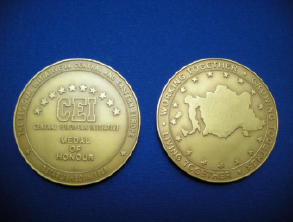 Medal of Honour
Medal of Honour- CEI Medal of Honour established. The CEI Medal of Honour was created by the decision of the CEI Ministers of Foreign Affairs in Wroclaw in June 2003 to award those who have acquired special merits in the framework of the CEI.
- Enhanced cooperation with Parliamentary Dimension and with the Business Dimension
- Conference on CEI Cooperation - bringing together Chairs of all Working Groups, CNC and Secretariat - regularly organised in Trieste.
- EC Focal Point for the CEI established
2002
Presidency:Macedonia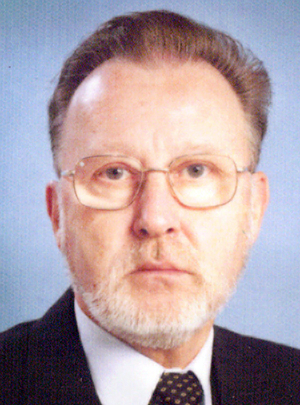 Amb. Harald Kreid
Amb. Harald Kreid- Amb. Harald Kreid (Austria)
Director General - CEI Guidelines and Rules of Procedure amended and adopted by CEI Summit in Skopje
- Amb. Harald Kreid (Austria)
2001
Presidency:Italy- CEI Cooperation Fund established
2000
Presidency:Hungary- FR Yugoslavia (later renamed State Union of Serbia and Montenegro) joins
1999
Presidency:Czech Republic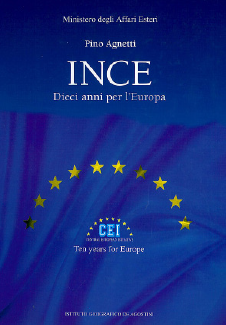 Publication on occasion of 10th Anniversary
Publication on occasion of 10th Anniversary- 10th Anniversary celebrated
- CEI actively engaged in Stability Pact
1998
Presidency:Croatia- CEI Solidarity Fund established
- MoU with UNECE
- Platform for a Dialogue between the CEI and the EU on a Political Level for the Development of CEI-EU Cooperation circulated at Summit in Zagreb
- First CEI Summit Economic Forum held in Zagreb: CEI major activity in the economic/business area until 2009
1997
Presidency:Bosnia and Herzegovina- First CEI Plan of Action adopted
- CEI CID renamed CEI-Executive Secretariat
- Sarajevo Declaration
- Coordination among regional organisations initiatied
1996
Presidency:Austria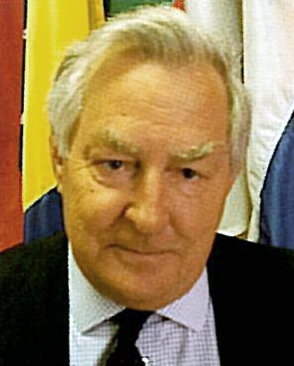 Amb. Paul Hartig
Amb. Paul Hartig- Albania, Bulgaria, Romania Belarus Moldova and Ukraine join
- Amb. Paul Hartig (Austria)
1st Director General - CEI CID inaugurated in Trieste
- CEI Headquarters Agreement concluded between Italian Government and Austrian CEI Presidency
- European Council endorses CEI mission
1995
Presidency:Poland- CEI Guidelines and Rules of Procedure adopted
- Decision to establish Centre for Information and Documentation (CEI CID)
- Austria joins EU
1994
Presidency:Italy- CEI Instrument for the Protection of Minority Rights adopted
- Official programme established: CEI Summit, MFA Meeting and other ministerial meetings in CEI areas of activity
1993
Presidency:Hungary- Czech Republic, Slovakia and Macedonia join
1992
Presidency:Austria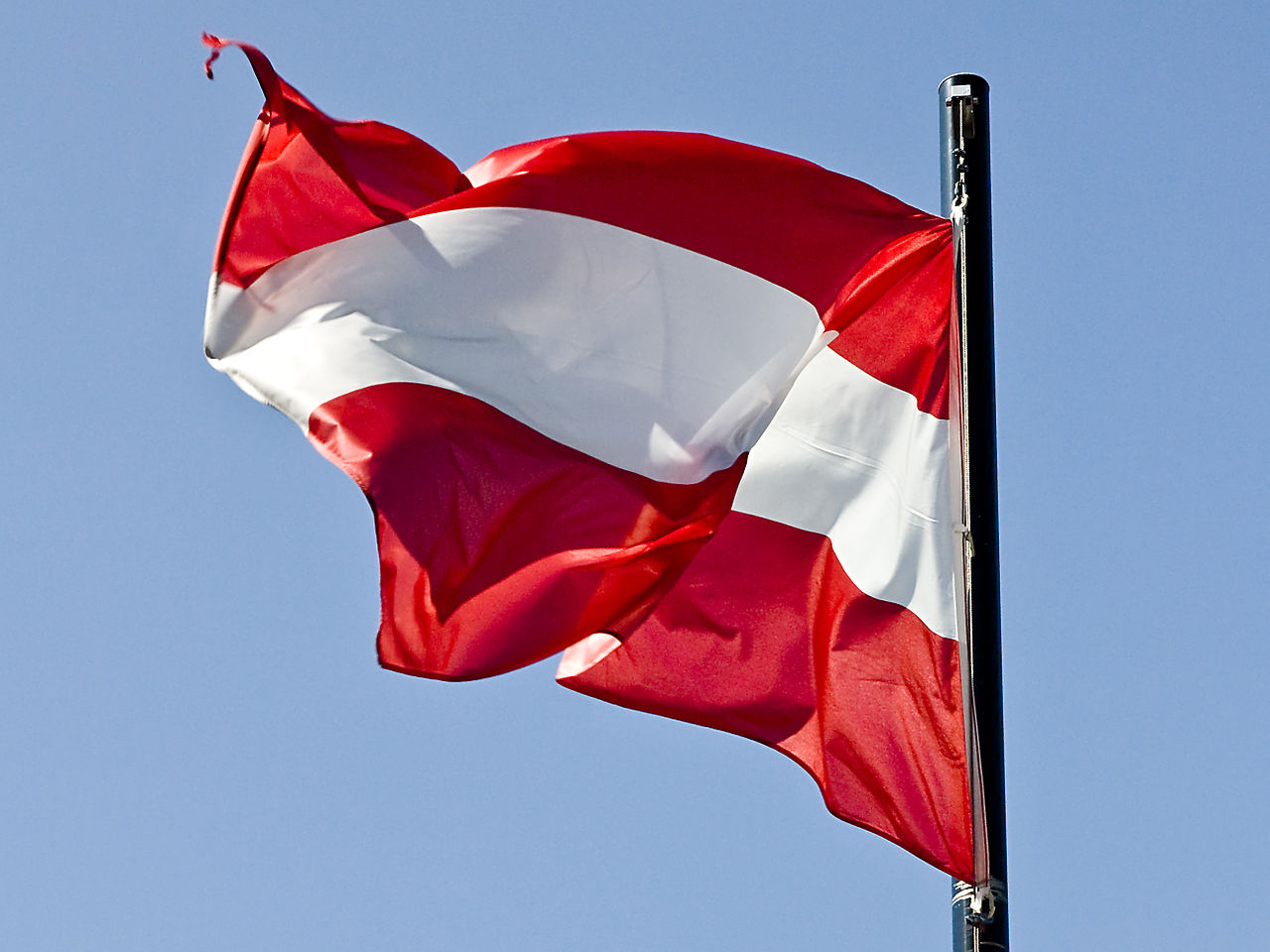
- Slovenia, Croatia, Bosnia and Herzegovina join Italian CEI Fund at the EBRD established
- Organisation renamed Central European Initaitive
1991
Presidency:SFR Yugoslavia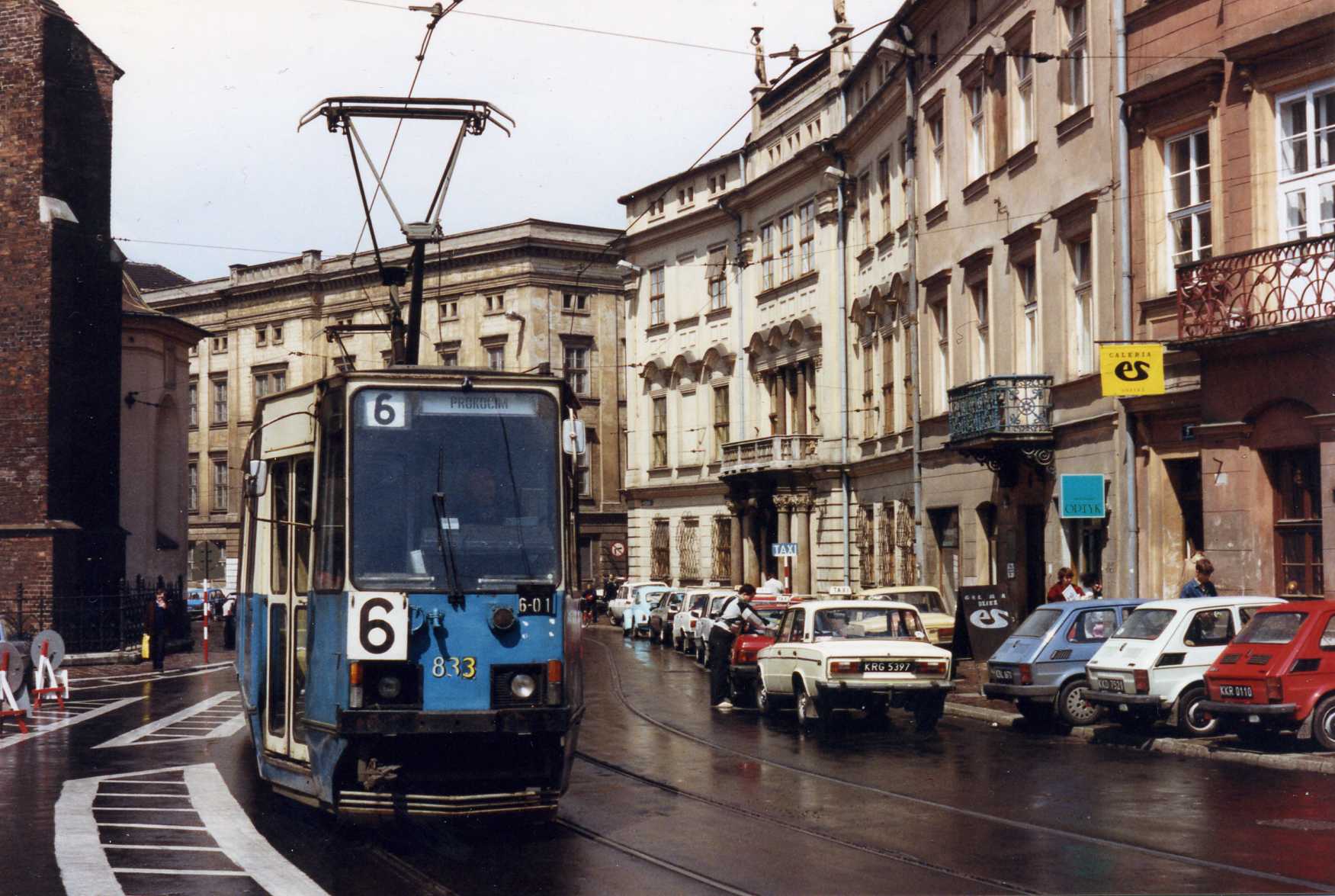 Streets of Krakow (1991)
Streets of Krakow (1991)- Poland joins (Hexagonale)
- Secretariat for Hexagonal projects established in London (later renamed Office for CEI Fund at EBRD)
1990
Presidency:Italy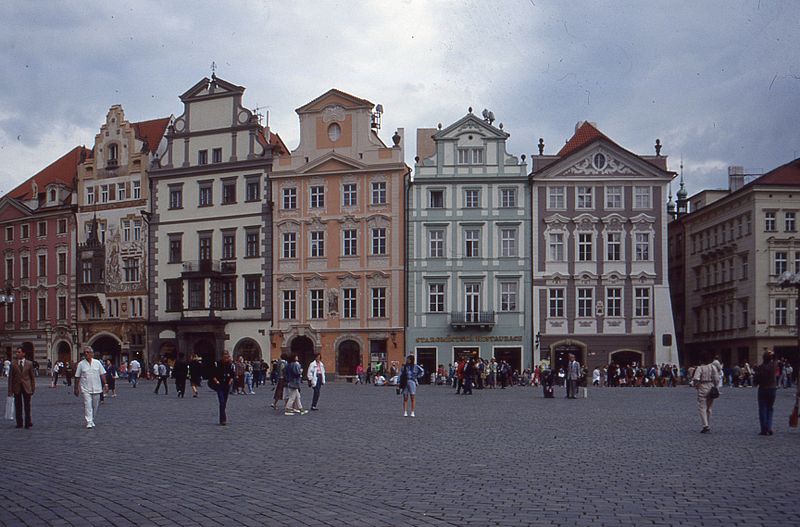
- Czechoslovakia joins (Pentagonale)
1989
Presidency:Hungary Berlin Wall: the first holes
Berlin Wall: the first holes- Italy, Austria, Hungary, SFR Yugoslavia establish the Quadragonale
- Fall of the Iron Curtain
